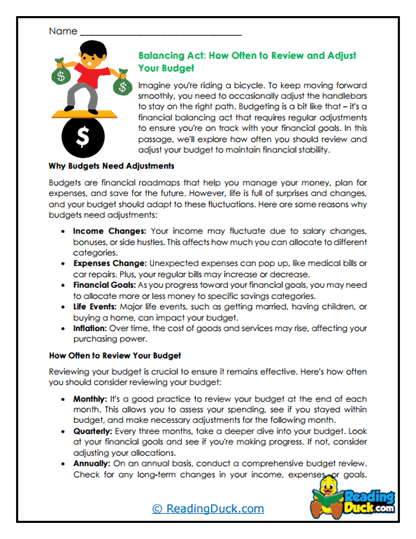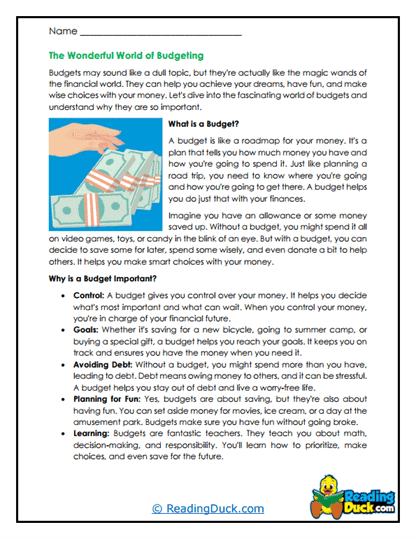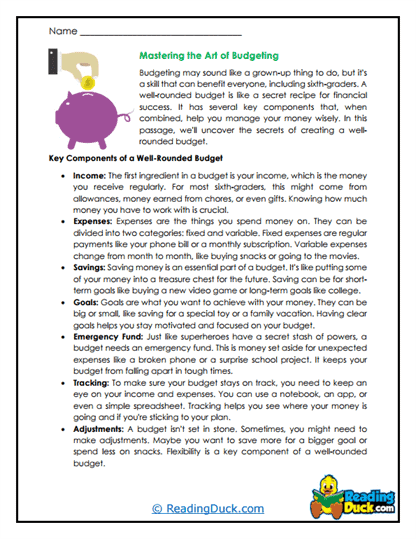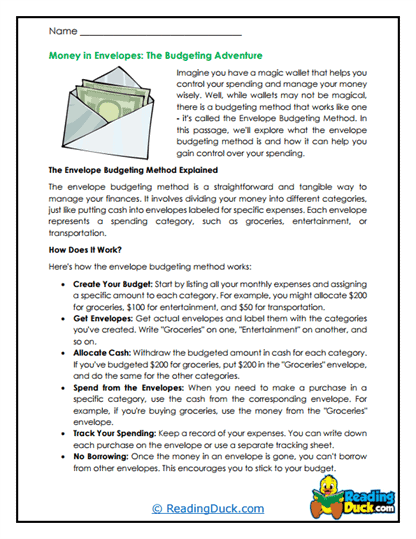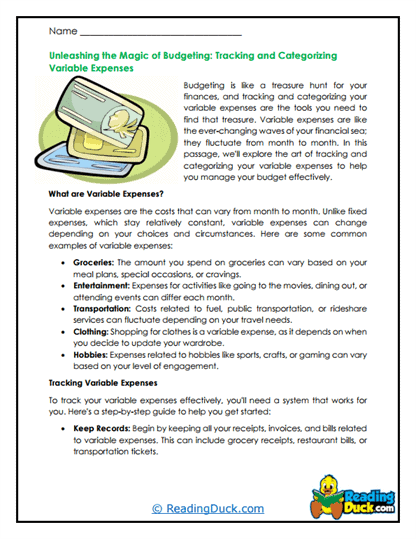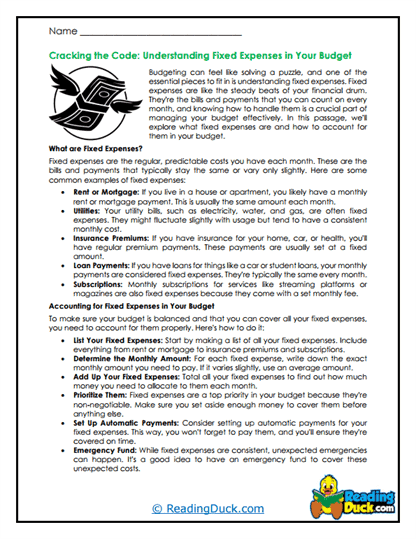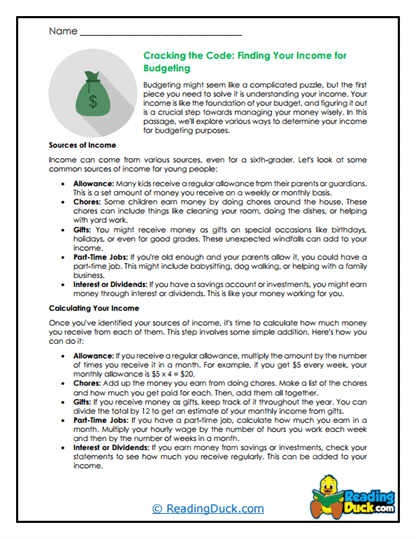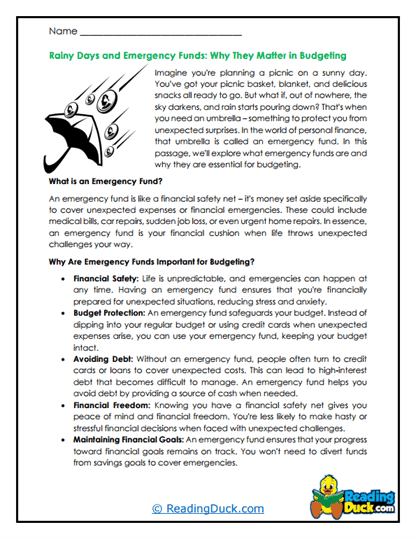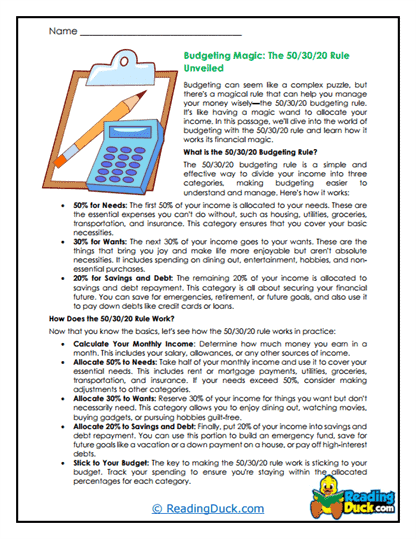Budgeting Worksheets
About Our Budgeting Worksheets
Our Budgeting Worksheets provide students with a practical and comprehensive introduction to one of the most essential skills in personal finance-budgeting. These worksheets are part of the Economics category, which covers a wide array of topics including Banking, Economic Systems, Financial Literacy, Real Estate, and the Stock Market. This particular collection focuses on teaching students how to manage their money effectively by creating and maintaining a budget, understanding income and expenses, and planning for future financial goals.
This topic contains several worksheet sets, each focusing on a specific aspect of budgeting. Each worksheet set includes:
- Multiple Choice Questions: These questions assess students' comprehension of the reading passages, focusing on key details about budgeting principles, types of budgets, and the importance of tracking expenses and income.
- Short Answer Questions: Students provide concise responses, summarizing important information, analyzing budgeting scenarios, and reflecting on how budgeting impacts financial decision-making.
- Open-Ended Questions: These questions encourage students to think critically and express their personal interpretations, opinions, and preferences related to budgeting topics, allowing them to connect the material to their own financial experiences and goals.
These worksheets help students demonstrate their understanding of budgeting while fostering meaningful engagement with the subject. An answer key is provided for each question sheet, making it easy for teachers and parents to evaluate student progress. All worksheets are available as PDF files, which can be easily viewed electronically, downloaded, and printed.
Mastering Money Management: The Fundamentals of Budgeting
Budgeting is a crucial skill that empowers individuals to take control of their finances, make informed decisions, and achieve their financial goals. At its core, budgeting involves planning how to allocate income to cover expenses, save for the future, and avoid debt. By learning how to budget, students gain the tools they need to manage their money wisely, live within their means, and prepare for financial challenges.
When studying budgeting, students encounter a variety of key concepts and areas of interest:
- Understanding Income and Expenses: The foundation of any budget is a clear understanding of income (the money you earn) and expenses (the money you spend). Students learn how to categorize different types of income, such as wages, allowances, and gifts, as well as various expenses, such as fixed costs (e.g., rent, utilities) and variable costs (e.g., entertainment, groceries). By identifying and tracking these elements, students can develop a realistic picture of their financial situation and begin to make informed decisions about their spending and saving.
- Types of Budgets: There are several different types of budgets, each designed to meet specific financial needs and goals. Students explore various budgeting methods, such as the zero-based budget, the 50/30/20 budget, and the envelope system. They learn how each type of budget can be tailored to suit individual preferences, whether it's prioritizing savings, managing debt, or controlling discretionary spending. This knowledge equips students with the flexibility to choose a budgeting method that aligns with their financial goals and lifestyle.
- The Importance of Savings: Savings play a critical role in financial stability and future planning. Students learn about the importance of setting aside money for both short-term and long-term goals, such as emergency funds, education, and retirement. They explore strategies for building savings, including setting up automatic transfers, cutting unnecessary expenses, and finding ways to increase income. Understanding the role of savings in a budget helps students appreciate the value of planning for the future and being prepared for unexpected financial challenges.
- Debt Management: Debt is a reality for many people, but managing it effectively is key to maintaining financial health. Students examine different types of debt, such as credit card debt, student loans, and mortgages, and learn about the impact of interest rates on borrowing costs. They explore strategies for managing and paying off debt, such as the debt snowball and debt avalanche methods. By understanding the consequences of debt and how to handle it responsibly, students can avoid financial pitfalls and maintain a healthy budget.
- Tracking and Adjusting the Budget: A budget is not a static document; it needs to be monitored and adjusted regularly to reflect changes in income, expenses, and financial goals. Students learn how to track their spending, compare it to their budget, and make necessary adjustments to stay on track. They explore tools and techniques for monitoring their budget, such as budgeting apps, spreadsheets, and financial journals. This practice of tracking and adjusting helps students develop the discipline needed to stick to a budget and achieve their financial objectives.
- Setting Financial Goals: Budgeting is most effective when it is goal-oriented. Students are encouraged to set specific, measurable, achievable, relevant, and time-bound (SMART) financial goals. These goals might include saving for a major purchase, paying off debt, or building an emergency fund. Students learn how to prioritize their goals within their budget and develop a plan to achieve them. Setting and working towards financial goals provides students with motivation and a sense of accomplishment as they see their financial progress.
Through these topics, students gain a comprehensive understanding of budgeting as a vital financial tool that helps them manage their money, avoid debt, and achieve their financial goals. They learn to appreciate the importance of budgeting in both personal finance and broader economic contexts.
Real-World Applications
Budgeting is an essential life skill that students need to learn early on to ensure their financial well-being in the future. Proficiency in budgeting enables students to take control of their finances, avoid debt, and build wealth over time. By mastering budgeting skills, students learn how to live within their means, prioritize their spending, and save for important goals, such as education, travel, or retirement.
In the real world, effective budgeting helps individuals make informed financial decisions, whether they are planning for major life events, managing monthly expenses, or investing in their future. Students who understand how to budget are better equipped to handle financial responsibilities, such as paying bills, managing loans, and saving for emergencies. They also develop the discipline and foresight needed to achieve long-term financial security and independence.
Moreover, budgeting skills are transferable to various aspects of life, including career planning, project management, and personal development. Students who learn how to budget effectively are more likely to succeed in both their personal and professional lives, as they can apply these principles to manage resources, set goals, and achieve success.
Using These Worksheets In A Curriculum
These budgeting worksheets can be seamlessly integrated into various subjects and classes, particularly in economics, personal finance, and mathematics courses. For middle school students, these worksheets introduce the basics of budgeting, helping them understand the importance of managing money and setting financial goals. For high school students, the worksheets can be used in more advanced courses to explore complex budgeting scenarios, such as managing debt, saving for college, and planning for retirement. Additionally, these worksheets can be incorporated into real-world applications, such as creating a mock budget or planning for a major purchase, to give students hands-on experience with budgeting concepts.
These worksheets not only reinforce key financial principles but also help students develop critical thinking and problem-solving skills. By analyzing real-world budgeting scenarios and answering questions that require them to apply their knowledge, students build a strong foundation in financial literacy that will serve them well throughout their lives.
Overall, the Budgeting Worksheets provide a comprehensive and engaging way for students to explore the importance of budgeting, gain a deeper understanding of its significance in personal finance, and develop the skills they need to manage their finances effectively.
